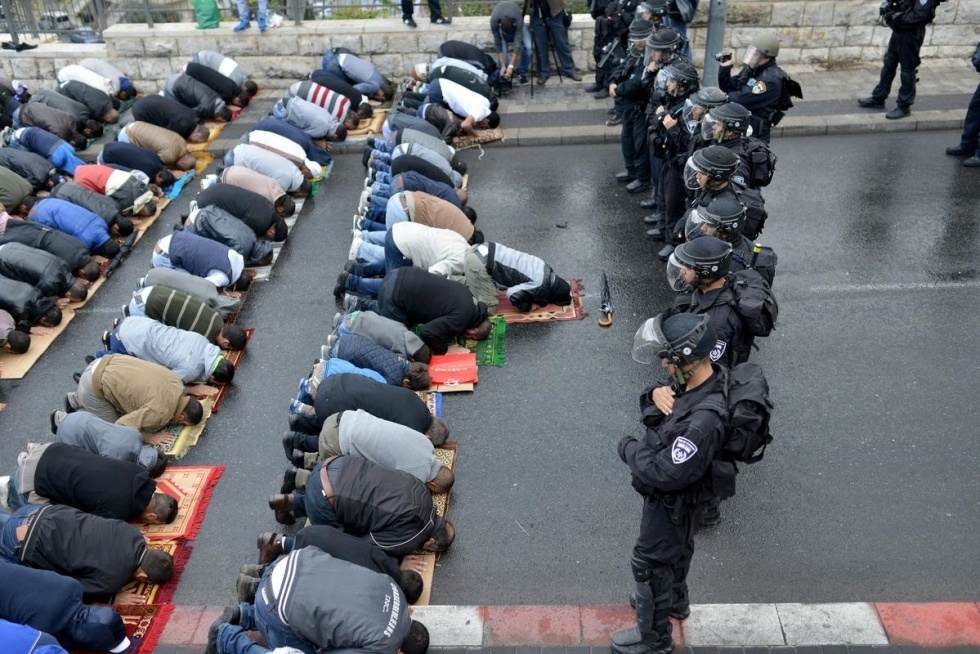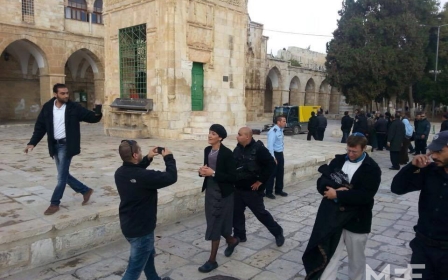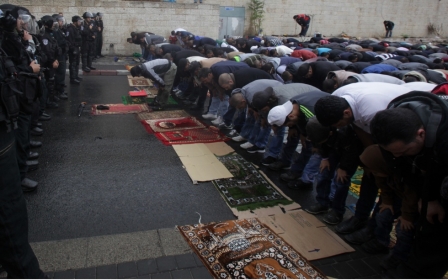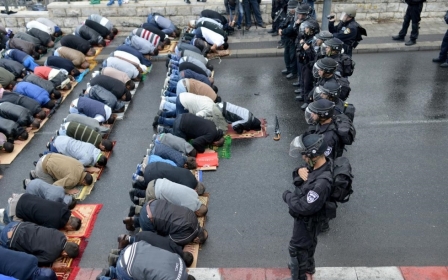500 East Jerusalem settlement units approved by Israel: watchdog

Israel has approved plans to build some 500 new settler homes in occupied East Jerusalem, according to a watchdog.
The interior ministry gave the go-ahead for the units - located in the existing settlement of Ramat Shlomo – on Monday, the Peace Now non-governmental organisation told AFP.
The move comes at a time of particularly high tensions in Occupied East Jerusalem, which has seen a rise in settlement expansion and also growing controversy over the al-Aqsa compound which was shut to tourists and Muslims wanting to pray for more than a day last week.
According to Palestinian officials, Israeli police arrested at least 23 Palestinians in East Jerusalem overnight and during Monday. Israeli police told AFP that they only arrested four, but would not confirm how many had been taken by other security services.
"The... decision on the 500 homes in the Ramat Shlomo settlement come after Prime Minister Benjamin Netanyahu's announcement last week that he would accelerate construction in East Jerusalem," Peace Now spokeswoman, Hagit Ofran said.
Ofran said the plans had been put on hold since 2006, but with the new approval, building itself could begin within six to 12 months.
On 27 October, Netanyahu's office pledged to build more than 1,000 new settler homes - more than 600 in Ramat Shlomo and around another 400 in Har Homa, another East Jerusalem settlement.
Settlements are deemed illegal under international law with the US State Department warning that it was "deeply concerned" over settlement building and the White House saying last month that continued settlement plans would "distance Israel from even its closest allies."
Israel, however, continues to insist that annexed East Jerusalem is an integral part of Israel and has continued to build settlements there.
"Israel is absolutely within its rights to build in Jewish neighbourhoods, and Palestinians have understood that these areas will remain under Israel control under any [peace] agreement," Netanyahu claimed last week.
"The decision to move forward in Ramat Shlomo is irresponsible," Ofran said. "It proves that Netanyahu does not want a two-state solution, only a settler state."
Al-Aqsa
The latest settlement announcement comes just days after a double shooting rocked the divided city, prompting the al-Aqsa compound to be fully closed to Muslims for the first time since 1990.
Last Wednesday evening, a gunman on a motorcycle shot a right-wing Israeli activist Yehuda Glick. Glick is best known for advocating for Jewish prayer in al-Aqsa – a highly controversial demand deemed illegal by Israeli law and considered highly offensive to Muslims.
A few hours after Glick’s shooting, in the early hours of Thursday, Israeli police shot dead a Palestinian man, Mu'taz Hijazi who they said was a prime suspect. Several eyewitness reports suggest that Hijazi was unarmed at the time. Abbas has since outraged Israel, calling Hijazi a "martyr" and the soldiers who killed him "terrorist gangs."
After Hijazi’s killing, Israeli authorities shut al-Aqsa to Muslims and tourists, in an act dubbed a “declaration of war” by Palestinian President, Mahmoud Abbas.
The move sparked widespread anger and protests in the West Bank, although large scale demonstrations failed to materialise in Jerusalem itself. The compound was opened again on Friday morning in time for morning prayers, although age restrictions remain and men under 50 continue to not be allowed in to pray.
Sacred to both Jews and Muslims, the flashpoint compound houses Islam's third holiest site, but is also revered as the most sacred spot for Jews, who refer to the site as the Temple Mount, believing it to house two ancient Jewish temples.
Knesset member, Shuli Moalem-Refaeli from the far-right Bayit Yehudi (Jewish Home) party, controversially entered the compound on Monday, sparking a skirmish with local Palestinian women who guard the area.
New MEE newsletter: Jerusalem Dispatch
Sign up to get the latest insights and analysis on Israel-Palestine, alongside Turkey Unpacked and other MEE newsletters
Middle East Eye delivers independent and unrivalled coverage and analysis of the Middle East, North Africa and beyond. To learn more about republishing this content and the associated fees, please fill out this form. More about MEE can be found here.




